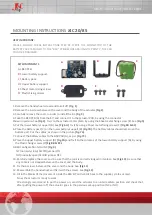1 Introduction
This document guides the hardware engineers to design and test their
LPC55(S)xx processor-based designs. The document provides information
about board layout recommendations and design checklists to ensure first
pass success and avoid any board bring-up problems.
This guide is released with the relevant device-specific hardware
documentation such as data sheets, reference manuals, and application notes
available on
2 LPC55(S)xx family comparison
All LPC55Sxx/LPC55xx family is based on Arm
®
Cortex
®
-M33 core, with
PowerQuad Accelerator and CASPER Accelerator. The S in the middle
of part name means this part provides more security features, such as
TrustZone Support.
Table 1. LPC55Sxx family core features
Family
Core
frequency
Dual
core
Power
Quad
CASPER
LPC55S0x/LPC550x
96 MHz
—
—
YES
LPC55S1x/LPC551x
150 MHz
—
—
YES
LPC55S2x/LPC552x
150 MHz
YES
YES
YES
LPC55S6x/LPC556x
150 MHz
YES
YES
YES
Table 2. LPC55Sxx/LPC55xx peripherals
Family
Flexcomm
50 MHz HS-
SPI
HS USB
FS USB
CAN FD
SDIO
LPC55S0x/LPC550x
8
1
—
—
1
—
LPC55S1x/LPC551x
8
1
1
1
1
—
LPC55S2x/LPC552x
8
1
1
1
—
1
LPC55S6x/LPC556x
8
1
1
1
—
1
Contents
Introduction......................................1
LPC55(S)xx family comparison.......1
Power supply...................................2
Introduction.................................. 2
Bulk and decoupling capacitors... 5
Clock circuitry..................................6
Introduction.................................. 6
Crystal oscillator...........................7
RTC oscillator.............................. 8
Common suggestions for the PCB
layout of oscillator circuit............10
Boot mode configurations............. 10
Boot mode selection.................. 11
Debug and programing interface...12
Debug connector pinouts...........14
Communication modules...............14
CAN interface for CAN-FD module
...................................................14
Analog........................................... 15
ADC impedance.........................15
Recommendations........................ 16
Pin descriptions..........................16
Termination of unused pins....... 17
PCB............................................18
General board layout guidelines
...................................................18
10 References....................................23
11 Revision history.............................23
AN13033
Hardware Design Guidelines for LPC55(S)xx Microcontrollers
Rev. 0 — 30 October 2020
Application Note


















